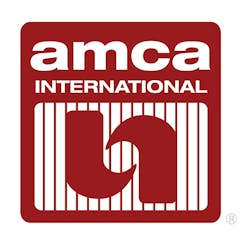AMCA at 100: A Century of Inclusion
As AMCA looks back on 100 years of service, a common thread runs through its history: a dedication to inclusion. AMCA is the association it is today because, in 1917, competing U.S. fan manufacturers decided to include each other in conversation rather than shut each other out, putting the industry’s long-term well-being ahead of their own short-term victories and setting a precedence for integrity. Since then, AMCA has never stopped finding ways to be inclusive—inclusive of more regions, inclusive of more products, and inclusive of more people.
During the 1930s, NAFM began distributing “Certified Ratings” stickers to members who tested in accordance with standard test codes. The NAFM Publicity Committee hoped the stickers would stir conversation, bringing more companies into the fold and encouraging testing and verification in harmony with peer-vetted standards.
In 1955, NAFM invited a number of manufacturer trade associations to consolidate and form the Air Moving and Conditioning Association, or AMCA. In 1970, AMCA added dampers and louvers to its list of products. With this change in scope came another name change, preserving the acronym while acknowledging the new product type: Air Movement and Control Association.
In 1963, AMCA moved from Detroit to the Chicago suburb of Arlington Heights. Not long after, construction of a laboratory with the capability for testing a high volume and wide variety of products was under way. The facility opened on March 14, 1968, boasting 12,500 sq ft of testing and office space. In 1985, it underwent a considerable expansion, growing to more than 21,000 sq ft, with the airflow capacity of the largest testing space increasing from 37,000 cfm to 94,000 cfm.
As AMCA’s membership grew, so did the demand for quality technical information. With a wealth of knowledge at its disposal through its members, AMCA started a magazine, AMCA inmotion, in 2006. Featuring experts in their field discussing the latest developments in air movement and control and providing tips and tricks for real-world application, 14 editions of AMCA inmotion have been published to date.
Perhaps the greatest example of AMCA’s inclusivity came in 1996. Exclusively an American organization, NAFM sponsored the Canadian Fan Manufacturer’s Association (CFM) when it was incorporated in 1945. NAFM and CFM worked closely, creating standards that could cross national lines. This partnership with CFM was only the beginning of the association’s drive to collaborate with and then fully include different regions worldwide. In 1996, after working closely with ISO (International Organization for Standardization), AMCA added “International” to its name to more fully reflect the global growth in its membership. In 1997, the creation of European AMCA allowed the association to focus more fully on issues specific to Europe. Asia AMCA was formed in 2011. AMCA currently is in the process of formalizing a Middle East region.
As AMCA reflects on its 100-year history, its staff is finding a lot worth celebrating. The association has been proudly growing to accommodate the needs of manufacturers and consumers alike, and it is expanding still. Behind AMCA stands a spirit of inclusion that welcomes people from all over the world to join it in fulfilling its mission: to promote the health, growth, and integrity of the air-movement-and-control industry.
Did you find this article useful? Send comments and suggestions to Executive Editor Scott Arnold at [email protected].


